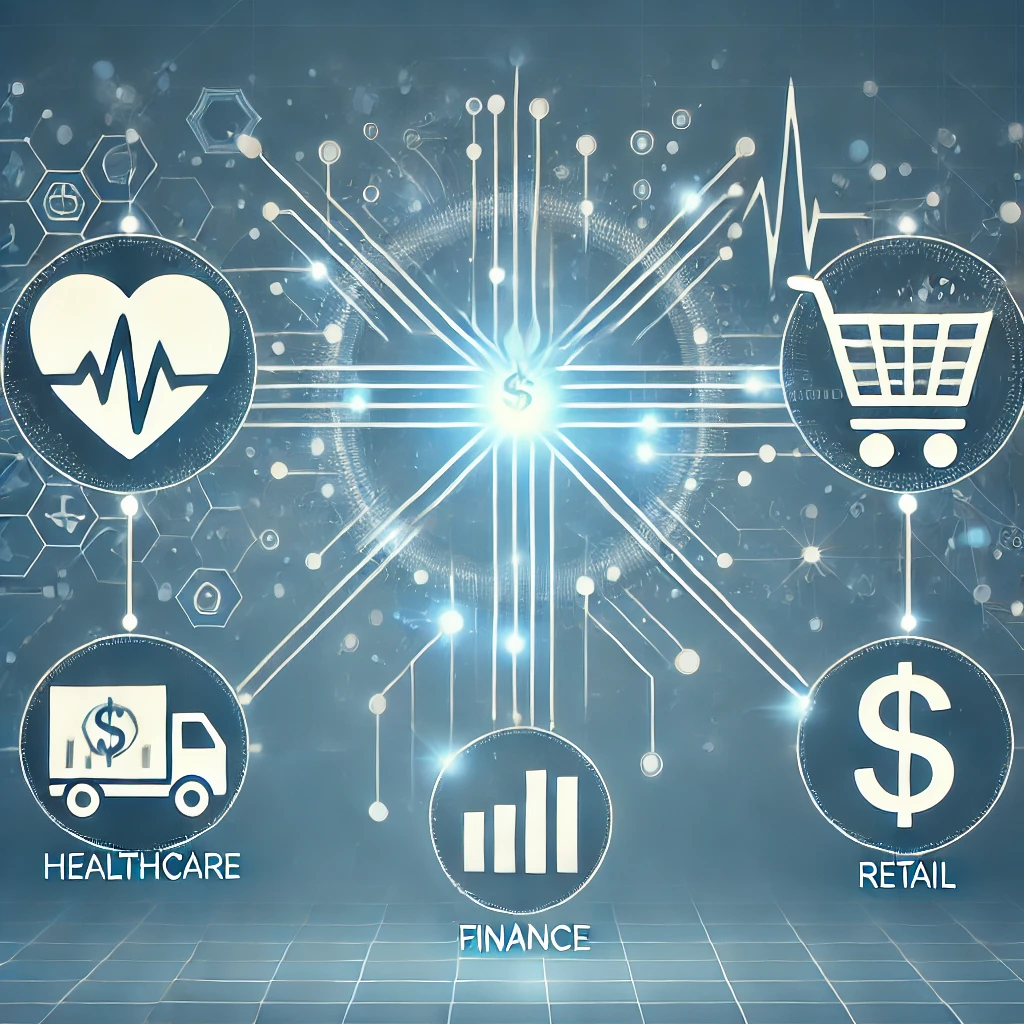Data science has emerged as a game-changer across multiple industries, revolutionizing how businesses and institutions make decisions, optimize operations, and enhance customer experiences. In particular, healthcare, finance, and retail have witnessed significant transformations due to data-driven insights. By leveraging machine learning, artificial intelligence (AI), and big data analytics, organizations in these sectors are enhancing efficiency, reducing risks, and personalizing services. This blog explores how data science is reshaping healthcare, finance, and retail, unlocking new possibilities and setting the foundation for the future.

Data Science in Healthcare
Predictive Analytics for Disease Diagnosis and Prevention
One of the most impactful applications of data science in healthcare is predictive analytics. AI-driven models analyze vast amounts of patient data to predict disease outbreaks, detect early signs of illnesses, and personalize treatment plans. Machine learning algorithms help identify patterns in medical histories, genetic information, and lifestyle choices to forecast risks and recommend preventive measures.
Drug Discovery and Development
Traditional drug development is time-consuming and costly. Data science accelerates this process by analyzing complex biological data, predicting drug interactions, and optimizing clinical trials. AI-powered simulations reduce the time required for drug discovery, enabling pharmaceutical companies to bring life-saving medications to market faster.
Personalized Treatment Plans
With advancements in precision medicine, data science helps create personalized treatment plans based on a patient’s genetic makeup, medical history, and real-time health data. This approach enhances the effectiveness of treatments while reducing side effects.
Electronic Health Records (EHR) and Real-Time Monitoring
Data science enables hospitals to manage vast amounts of patient records efficiently. AI-driven systems analyze EHR data to detect anomalies, suggest treatments, and improve patient outcomes. Wearable devices and IoT-powered sensors further enhance real-time health monitoring, alerting doctors to potential health issues before they become critical.
Fraud Detection and Healthcare Security
Data science enhances security in healthcare by identifying fraudulent claims and detecting cyber threats. AI-driven fraud detection systems analyze billing data, insurance claims, and transaction patterns to prevent financial losses and ensure compliance with regulations.
Data Science in Finance
Fraud Detection and Risk Management
The finance industry relies heavily on data science for fraud detection and risk assessment. AI-powered models analyze transaction patterns to detect fraudulent activities in real time. Machine learning algorithms assess credit risks, helping banks and financial institutions make informed lending decisions.
Algorithmic Trading
Data science has transformed stock markets through algorithmic trading, where AI models analyze historical data, news sentiment, and market trends to execute trades with precision. High-frequency trading (HFT) leverages AI to make split-second investment decisions, optimizing portfolio returns.
Customer Segmentation and Personalized Banking
Banks and financial institutions use data science to segment customers based on behavior, income levels, and financial history. AI-driven chatbots and virtual assistants provide personalized banking services, offering investment advice and financial planning recommendations tailored to individual needs.
Regulatory Compliance and Risk Forecasting
Financial institutions must comply with strict regulations. Data science streamlines regulatory compliance by automating documentation, monitoring transactions for suspicious activities, and ensuring adherence to anti-money laundering (AML) laws. AI-powered risk forecasting helps businesses anticipate market fluctuations and mitigate financial losses.
Insurance Underwriting and Claims Processing
Data science optimizes the insurance industry by automating underwriting and claims processing. AI-driven models assess policyholder risks, streamline claims verification, and detect fraudulent claims, enhancing operational efficiency.
Data Science in Retail
Personalized Shopping Experiences
Retailers use data science to analyze customer preferences, purchase history, and online behavior to deliver personalized recommendations. AI-driven recommendation engines, such as those used by Amazon and Netflix, enhance customer engagement and increase sales.
Demand Forecasting and Inventory Management
Accurate demand forecasting is crucial in retail. Machine learning algorithms analyze past sales data, market trends, and external factors (e.g., weather, holidays to optimize inventory levels. This prevents stock shortages and reduces overstocking, leading to cost savings.
Pricing Optimization
Data science enables dynamic pricing strategies where retailers adjust prices based on real-time demand, competitor pricing, and market conditions. AI-driven pricing models ensure competitive pricing while maximizing profits.
Customer Sentiment Analysis
Retailers leverage natural language processing (NLP) to analyze customer reviews, social media interactions, and feedback to understand consumer sentiment. This helps brands improve products, address customer concerns, and enhance overall customer satisfaction.
Fraud Prevention and Secure Transactions
Retailers use AI-powered fraud detection systems to identify suspicious transactions and prevent credit card fraud. Machine learning models analyze purchasing behaviors to flag anomalies, ensuring secure online and in-store transactions.
Challenges and Future of Data Science in These Industries
Challenges
- Data Privacy and Security: Protecting sensitive data from cyber threats and ensuring regulatory compliance remains a challenge.
- Data Quality and Integration: Ensuring clean, structured data from multiple sources is crucial for accurate insights.
- Implementation Costs: Integrating data science solutions requires significant investment in infrastructure and expertise.
- Ethical Concerns: AI-driven decision-making must be transparent and free from bias to maintain trust.
Future Prospects
- AI-Powered Healthcare Assistants: Virtual health assistants powered by AI will offer real-time medical guidance.
- Decentralized Finance (DeFi): Blockchain and AI will revolutionize financial transactions and investments.
- Autonomous Retail Stores: AI-driven stores with cashier-less checkouts will redefine shopping experiences.
- Hyper-Personalization: Advanced AI algorithms will provide even more tailored experiences in healthcare, finance, and retail.
Conclusion
Data science is transforming healthcare, finance, and retail by providing intelligent insights, enhancing decision-making, and optimizing processes. From predictive analytics in healthcare to fraud detection in finance and personalized shopping experiences in retail, AI and machine learning are shaping the future of these industries. While challenges remain, the continuous advancements in data science will unlock new opportunities, revolutionizing how businesses and institutions operate in an increasingly data-driven world.
